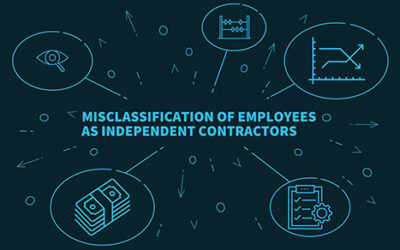The IRS recently released guidance providing the 2024 inflation-adjusted amounts for Health Savings Accounts (HSAs). HSA fundamentals An HSA is a...
Blog
If you’re hiring independent contractors, make sure they’re properly handled
Many businesses use independent contractors to help keep their costs down — especially in these times of staff shortages and inflationary pressures....
4 tax challenges you may encounter if you’re retiring soon
Are you getting ready to retire? If so, you’ll soon experience changes in your lifestyle and income sources that may have numerous tax implications....
Use the tax code to make business losses less painful
Whether you’re operating a new company or an established business, losses can happen. The federal tax code may help soften the blow by allowing...
The IRS clarifies what counts as qualified medical expenses
If you itemize deductions on your tax return, you may wonder: What medical expenses can I include? The IRS recently issued some frequently asked...
Retirement saving options for your small business: Keep it simple
If you’re thinking about setting up a retirement plan for yourself and your employees, but you’re worried about the financial commitment and...
Buying a new business vehicle? A heavy SUV is a tax-smart choice
If you’re buying or replacing a vehicle that you’ll use in your business, be aware that a heavy SUV may provide a more generous tax break this year...
Have employees who receive tips? Here are the tax implications
Many businesses in certain industries employ individuals who receive tips as part of their compensation. These businesses include restaurants,...
Tax-saving ways to help pay for college — once your child starts attending
If you have a child or grandchild in college — congratulations! To help pay for the expenses, many parents and grandparents saved for years in...
How the new SECURE 2.0 law may affect your business
If your small business has a retirement plan, and even if it doesn’t, you may see changes and benefits from a new law. The Setting Every Community...
Tax-wise ways to save for college
If you’re a parent or grandparent with college-bound children, you may want to save to fund future education costs. Here are several approaches to...
Employers should be wary of ERC claims that are too good to be true
The Employee Retention Credit (ERC) was a valuable tax credit that helped employers that kept workers on staff during the height of the COVID-19...
Renting to a relative? Watch out for tax traps
If you own a home and rent it to a relative, you may be surprised to find out there could be tax consequences. Quick rundown of the rules Renting...
How to minimize the S corporation LIFO recapture tax
If you’re considering converting your C corporation to an S corporation, be aware that there may be tax implications if you’ve been using the last...
The standard business mileage rate is going up in 2023
Although the national price of gas is a bit lower than it was a year ago, the optional standard mileage rate used to calculate the deductible cost...

Have a Question You Need Answered?
Schedule an Appointment Today!

















